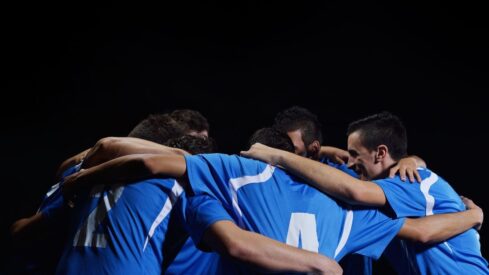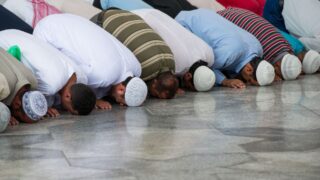From ancient times, there was a discovery that sport has a positive effect on behaviors; especially at the youth age. Plato, a great philosopher, considered it an influencer in building the personality, and he proclaimed the necessity of engaging in sports and Music for the fighter. Furthermore, the sport remains in people’s memory as one of the strong stimulants for moral building, an excellent moral exemplar, combating deviations, and building an excellent personality.
In the middle of the 19th century, the British began to include sport in their schools for its stimulating role in personality building, and entrenching positive values such as self-reliance, creativity, the ability to overcome challenges, and the ability to combat youth delinquency.
In 2019, the United nation has advised that sport should be added to the strategies of combating youth crimes as it considered inclining to sport one of the most powerful reinforcements in crime prevention and deviations amongst the youth. In fact, it called for its utilization in community rehabilitation of criminals relying on the resolutions of “The Declaration of Doha” in the year 2015. Also, in Bangkok, the capital of Thailand, the experts of the United Nations revised the research evidence on the role of sport in combating crime after which they concluded that sport could be an active tool for crime prevention, and that it could also strengthen preventive factors against the crime and violence.
The truth is that sports could be useful in crime prevention. This could be because the sport changes perceptions about the body and connects it with its value system, as it (the sport) ensures societal goals through the inculcation of moral values such as; justice, equity, and inclusion. However, the sport alone is not sufficient to flag off moral duty without investing in education, health, and economic sectors.
The Dilemma of Reconciliation:
There is a foundation problem in the relationship between sport and manners. The aim of the sport is to win, “the result says everything”. Also, the sport is built on the spirit of serious competition, and this spirit might not give enough space for the moral aspect to engrain. Here occurs a dilemma in the method of integrating competing with morals especially when the sport is solely built on violence and physical docking.
It is good to note that both sport and manners are founded due to commonalities between them; whereby the victory in sport must be in conformity with the moral aspect through the implementation of rules of justice that are peculiar to the game that must be respected. Whereas, victory through cheating, deceit, evil, and bribery is condemned. This connection between victory and manners becomes a way of life amongst the populace of which its majority rejects a victory that is diluted with immoral conducts. Likewise, the value of justice becomes recognized in the spear of sport, and the path to victory becomes the same as victory itself. With this, a change in social awareness towards unethical behaviors in sport has occurred. Hence, the thought that “the result says everything” is no longer the overwhelming thought in the mind of a sportsman.
Furthermore, it is noticed that sport has become one of the moral training grounds for its role in “discipline perfection” because there is the need for every sportsman to abide by the sport’s rules and regulations. This compliance with the rules became one of the yardsticks used for honoring the sportsmen, and a huge number of the populace became aware of these rules as they became capable of employing clear yardsticks in judging the morals of the sportsmen.
At the level of the sportsmen, the sport has encouraged self-control, respecting the rules, following the regulations, respecting the leadership, and abiding by the standards. Self-control has become one of the most important standards used in evaluating sports personality. Here, the sport training parallels moral training; both of which are important complimenting components in building the personality of a sportsman. Also, most sportsmen exert efforts in their collective sports such as football with the spirit of their team, the spirit with which individual skills rhythms with those of the other team members in order to achieve victory. From another angle, the sport tends to reinforce the idea and the culture of respecting the loser. This is why we witness in most football matches handshaking among the players after the match. Due to this moral benefits of the sport, some global projects emerged whose aim is to utilize sport in ethical reformation. Among them are:
The second Term Project in England, it’s aim was to reform the manners of the criminal and also to foster skills and positive life situations, and groom them for returning to their community. The program has archived some results.
Midnight Basketball: this is an initiative in the United State in the late 80s and 90s. The initiative aims at keeping the youth away from crimes and intoxicants by moving them out of the streets during the last hours of the night and engaging them in sport activities in order to reduce the deviation.
Can the Sport Combat the Crime?
There exist on this problem divergence of opinion, but the prominent view is that sport alone is not sufficient in character and ethical reformation likewise, in combating deviation and delinquency. In other words, the sport requires collaborative efforts of other factors for it to become an entry point for moral and ethical reformation. In making reference to numerous important literatures in this aspect, an American professor of Sociology, Douglas Hartmann, pointed out in his book “Basketball in the Mid-night” that this program which started in the city of Chicago and moved to many cities of America with the aim of preventing the black American youth from crimes was accompanied by too much propaganda that was greater than the result acquired in real sense.
Hartmann belittled the popular sayings that sport is capable of helping the less privileged overcome their daily worries as well as protecting them from swerving towards crimes. He disclosed that politics played a role in the reduction of the societal and moral intent of the program. Instead of addressing the fault in the equality which the blacks suffer, the program became a means to monitor the black youth in communities of the poor. The book also reveals that the number of those who participated in the program was extremely small and that the presence of policemen close to the match was a condition for organizing matches.
The Book “Sport and Crime”
In the book “Sport and Crime” which was co-authored by a British professor of Sociology, Peter Millward, they touched on issues related to sport among which is its ability to combat crimes and violence, and the relationship between crimes and sport. The most interesting thing is that he specified a part for discussion on Qatar 2022 World cup.
As for the book “Preventing youth crimes and Sport”, Yvon Dandurand and Jon Heidt. It emphasizes that the programs for crime prevention that are sport based have gained increased attention across the globe, in spite of few studies and filed research on the subject. In an important study of the United Nations on ‘The Role of Sport in the Prevention of Intoxicants” in the year 2002, it emphasizes that sport could be one of the preventive measures against hard drugs. The study however stresses that no single solution is considered the best for all.
The Book: Youth Crime Prevention and Sport
There was a Bak study that points out that sport is capable of influencing addiction and deviation. The study also stresses that participation in sport could increase the danger of drug taking in some adolescents and that there is a link between participation in some sport games and the higher monitor rates from consumption of alcohol and intoxicants. The sportsmen are no less immune from consumption of intoxicants and addiction from any other person. in fact, their dangers might increase because of serious pressure in a bid to improve their performance”.
Despite all these, the correlation between sport and manners stands. Hence, the sport remains one important way of character building.


















